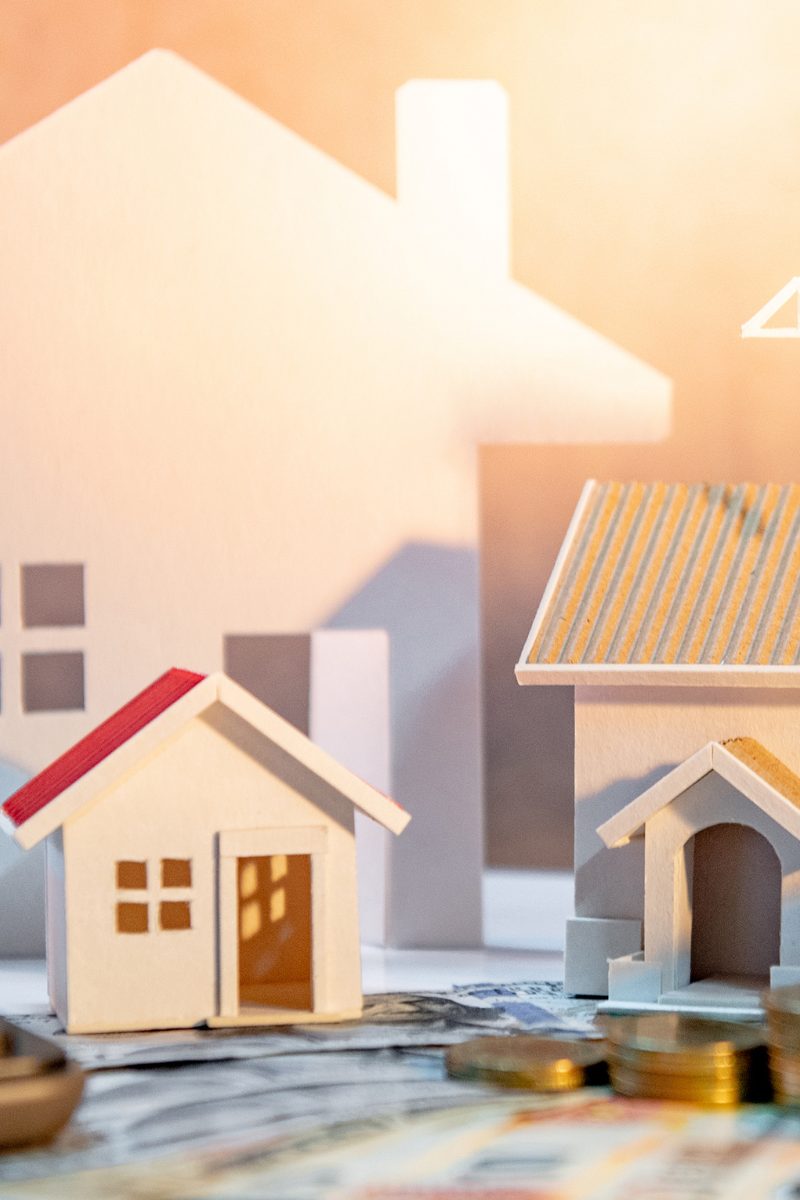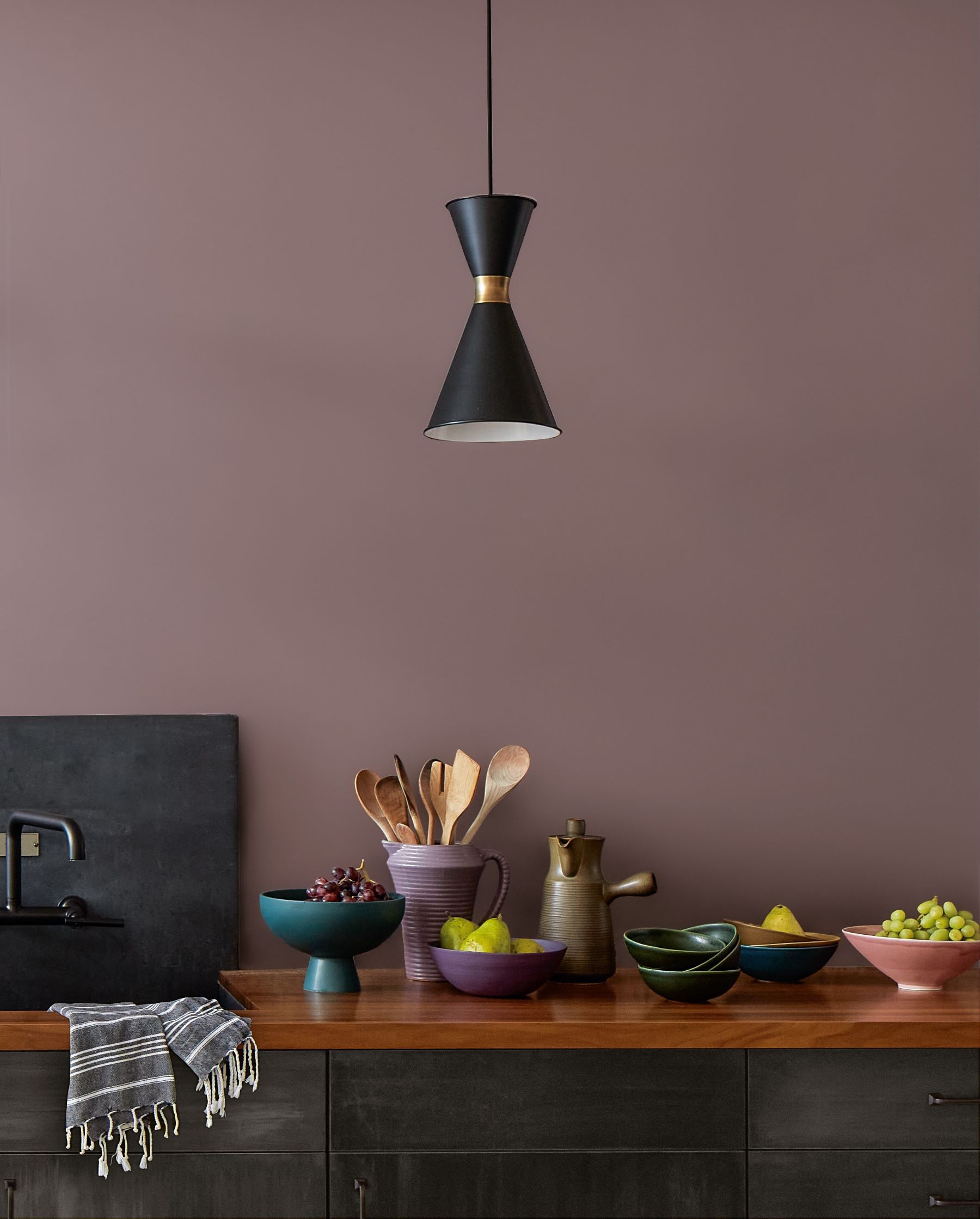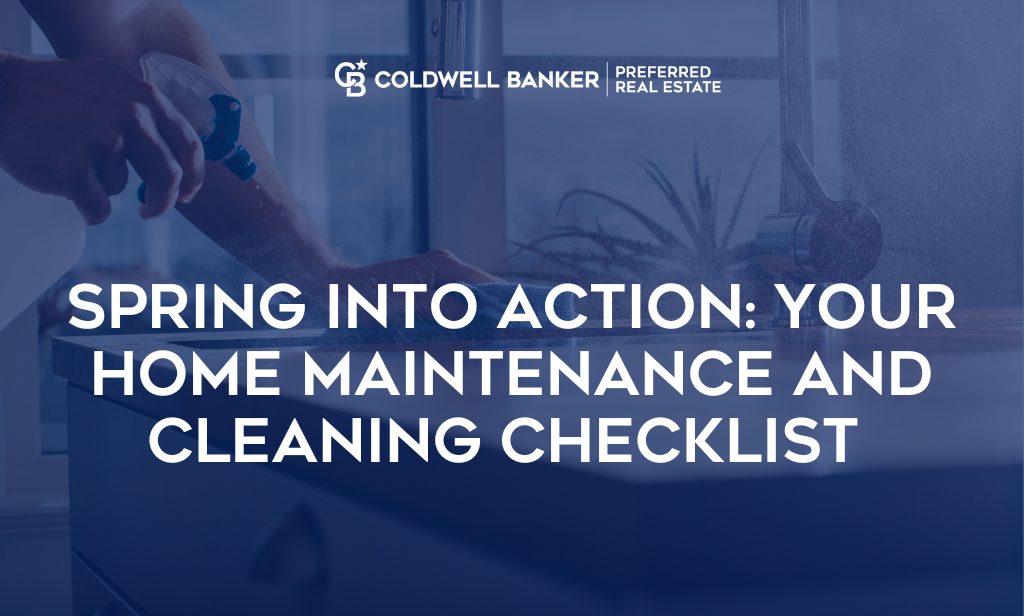
Get ahead of spring cleaning early with simple updates that enhance comfort, clarity, and curb appeal.
A seasonal refresh does not have to wait for the first warm day. A few small, intentional changes now can help your home feel lighter, calmer, and ready for the months ahead.
Spring has a way of arriving all at once. The snow melts, the light shifts, and suddenly there is pressure to deep clean everything in a single weekend. But a full reset does not need to happen overnight.
In fact, starting early is one of the easiest ways to avoid overwhelm. A gradual refresh gives you time to be thoughtful about your space, rather than be reactive to it.
Coldwell Banker Preferred recommends treating your seasonal reset like a ritual. Just as you rotate your wardrobe or store away winter gear, your home benefits from a gentle transition, too. Here is how to start.
Simplify Surfaces First
If you are not sure where to begin, look at what you see most.
Kitchen countertops, bathroom vanities, entryway tables, and coffee tables naturally collect everyday items. Over time, even useful objects can create visual clutter.
Start by clearing everything off one surface. Wipe it down completely. Then return only what you use daily or genuinely enjoy having on display. Consider grouping essentials on a tray to keep things intentional and tidy.
This small reset can instantly change how a room feels. Clean, simplified surfaces make a home look more cared for and easier to maintain.


Lighten Up Your Space
Canadian winters often mean heavier textures, darker tones, and layered décor meant to create warmth and comfort.
As the days slowly grow longer, try introducing lighter elements into your home. Swap out thick throws for breathable fabrics. Replace deep winter accents with softer neutrals. Add greenery or subtle florals to bring in a sense of freshness.
You do not need to redecorate. Even a few small seasonal updates can shift the atmosphere of a room and make it feel brighter and more open.
Tackle the Closet with the Three-Month Rule
Closets are one of the most practical places to start your reset.
Use the three-month rule as your guide. If you have not worn something in the past three months, it may be time to reconsider whether it still serves you. Be realistic about what fits your lifestyle today, not just what you hope to wear someday.
Donate pieces that no longer work for you. A streamlined closet makes daily routines simpler and creates space for what you truly use.


Start Small to Stay Ahead
One of the biggest mistakes people make with spring cleaning is trying to do everything at once.
Instead, focus on one space at a time. A single drawer. One shelf. One bathroom cabinet. Small, manageable tasks build momentum and prevent burnout.
By starting now, you will welcome spring feeling ahead, not behind. When the season officially changes, your home will already feel refreshed rather than in need of a full overhaul.
Ultimately, a seasonal reset is not about perfection. It is about intention.
A few thoughtful changes can make your home feel lighter, more organized, and easier to enjoy. And if you are considering selling in the months ahead, a well-maintained and thoughtfully styled home always makes a strong first impression.
At Coldwell Banker Preferred Real Estate, we know your home evolves with the seasons. A simple reset today can set the tone for a fresh start tomorrow.
Preparation today. Confidence tomorrow. That’s North of Extraordinary.

Sales tick upward, inventory holds steady and confidence returns as Canada’s housing market sets a stable pace heading into 2026.
After a brief pause in September, Canada’s housing market resumed its climb in October. National home sales rose 0.9% month over month, marking the sixth gain in the past seven months. The uptick came despite a 1.4% drop in new listings, tightening market conditions. With sales rising and inventory holding steady at 4.4 months of supply, balanced conditions remain the dominant theme heading into the final stretch of 2025.
Steady Demand, Limited Supply
October’s rise in sales confirms what many Coldwell Banker Canada professionals have been observing on the ground: confidence is finally returning.
“We are in a market where stability is setting the tone,” said Karim Kennedy, Chief Executive Officer of Coldwell Banker Canada. “The extremes of the past few years have made Canadians more selective, more informed and more intentional about real estate decisions. That’s not a bad thing. It’s creating space for smarter conversations, and for clients to plan rather than react.”
Even with improved sales activity, prices have remained flat. The national MLS Home Price Index edged up just 0.2% from September, while the average sale price came in at $690,195, down 1.1% compared to October 2024. Regional variation continues to play a key role, with affordable markets in the Prairies and Atlantic Canada seeing small gains while larger markets like Toronto and Vancouver remain steady.
Balanced Conditions Create Space to Act
Buyers are finding themselves in a more predictable environment than they have seen in years. Inventory has stabilized and the pace of sales has returned to pre-COVID levels. Meanwhile, sellers are pricing more realistically, knowing that today’s buyers are well-informed and not in a rush.
“This is a strategy market,” explained Hashim Arthur, Chief Operating Officer of Coldwell Banker Canada. “In this kind of environment, the agents who win are the ones who bring energy and local insight. Sellers need clarity, not hype. And buyers want guidance they can trust. That’s where we’re focusing our leadership.”
The national sales-to-new-listings ratio tightened to 52.2% in October, moving closer to historical norms. With fewer new homes coming to market and demand gradually strengthening, sellers who list before the year ends could benefit from reduced competition and serious buyers eager to transact before 2026.
Government Policy and Market Outlook
The federal government’s 2025 budget included several housing-focused measures, including eliminating the Underused Housing Tax and offering GST relief for first-time buyers. These policies, while still ramping up, are expected to provide modest support to affordability and supply heading into the new year.
The Bank of Canada’s recent rate cuts have pushed borrowing costs to their lowest level since early 2022. With rates now more favourable and additional cuts still possible, experts anticipate continued activity through the winter and into the spring.
“If you’re a buyer who has been on the sidelines, now is the time to get organized and start planning,” noted Arthur. “For sellers, success today is about getting the fundamentals right. When pricing and presentation align, even a balanced market can deliver strong results.”

Looking Ahead
As 2025 winds down, there is a sense of optimism in the real estate community. While economic uncertainty and affordability concerns remain, the fundamentals of housing demand in Canada, including population growth, employment stability, and buyer sentiment, are pointing in the right direction.
“The market is no longer swinging between extremes, and that is a good thing,” added Kennedy. “We‘re entering a phase where thoughtful decisions, good advice and local insight matter more than ever. Our teams are helping Canadians navigate it with confidence and clarity.”
With balance in place and confidence on the rise, the final months of 2025 could lay the foundation for a strong start to the new year.


As the leaves change and the air turns crisp, fall is the perfect season to get your home ready for winter. A few well-timed maintenance tasks now can spare you big repair bills later. Here are 7 fall must-dos that homeowners swear by - from builders, home inpectors, trusted trades, and our own real estate experts here at Coldwell Banker Preferred.

1. Inspect the roof and clear the gutters (prevent leaks and ice dams)
Why: Manitoba’s freeze-thaw swings and heavy snow loads can expose weak spots on roofs and create ice dams if gutters are clogged.
What to do: From the ground or with binoculars, look for missing/curled shingles, damaged flashing around vents/chimneys, and sagging or clogged eavestroughs. Clean gutters after most leaves have fallen and make sure downspouts direct water well away from the foundation. If you spot damage, get a roofer to repair flashing or replace shingles before winter.
2. Service your furnace and change filters (for efficiency and safety)
Why: A fall HVAC check keeps heat reliable and efficient — and helps prevent mid-winter failures.
What to do: Replace or clean furnace filters, check for odd smells or noises, and schedule a pro HVAC tune-up if it’s been more than a year. Early-season scheduling often gets you faster appointments and better pricing than last-minute calls in December.


3. Test and winterize your sump pump / basement drainage
Why: Frozen discharge lines or a failed sump pump can mean costly basement flooding — a frequent worry in Winnipeg area homes.
What to do: Test the pump by pouring water into the pit until it activates. Remove any flexible discharge hoses from exterior faucets at 0°C and consider installing something to divert the water away from your home. This can range between a simple pre-made splash block or a more elaborate pipe system. If the slope is good outside your foundation where the sump discharge pipe is located, and the drainage also satisfactory, you may be able to place a block or pad directly below the pipe. This should prevent a small crater from forming in the soil when it is not yet fully frozen. If in doubt, call a plumber or basement/waterproofing pro.
4) Seal gaps, check weatherstripping, and top up insulation
Why: Small air leaks around windows, doors, and rim joists silently drive up heating bills and let in drafts.
What to do: Replace worn weatherstripping on exterior doors, add caulking around window frames and exterior penetrations, and check attic insulation levels for any gaps, compressed areas, or spots where insulation has shifted away from the joists. Examine the sofit vents to ensure there is nothing blocking airflow to ensure proper ventilation.


5. Winterize outdoor plumbing & irrigation
Why: Frozen outdoor taps and irrigation lines can burst and cause water damage.
That to do: Disconnect your outdoor hoses. Then, drain and shut off the water supply leading to any outdoor faucets – those are the first to freeze.
After turning off the water supply (shut off valves inside the house), leave outdoor taps slightly open for a minute or two to ensure any remaining water drains before it freezes and expands.
If you have in-ground irrigation, follow the manufacturer or contractor’s recommended winter drain procedure.
6. Clean & inspect chimneys, fireplaces, and wood stoves
Why: Creosote and flammable soot buildup and blocked flues are fire hazards; proper servicing improves safety and performance.
What to do: If you use a fireplace or wood stove, have the flue inspected and swept when needed. Inspect chimney caps and flashing, the bricks and mortar, and the dampers. Ensure air is circulating freely and that there are no obstructions in the air openings — and never start the heating season with more than a quick visual check if you burn wood regularly.


7) Trim trees, secure exterior fixtures, and prep for snow
Why: Wind, ice, and heavy snow weigh on branches and loose fixtures — a broken limb or loose siding can damage your home (or a neighbor’s car).
What to do: Trim overhanging limbs away from the roof, check exterior caulking and siding for places water could get in, and move or secure outdoor furniture and seasonal decor. Make a simple plan for snow removal access (walkways, entrances, HVAC clearances) so snow season isn’t an emergency scramble.

Fall in Manitoba is short — but taking a few weekends now to prepare your home can save you headaches (and money) once winter settles in. These small maintenance steps not only protect your biggest investment but also boost comfort, energy efficiency, and resale appeal. Whether you’re planning to stay cozy all winter or thinking about listing in the spring, a well-cared-for home always stands out.
If you ever need trusted local professionals or more seasonal home advice, connect with your Coldwell Banker Preferred Real Estate team — we’re always here to help you protect, maintain, and love where you live.


As the leaves turn and the air gets crisp, the Manitoba real estate market takes on a cozy charm of its own. Fall is actually a fantastic time to sell your home — buyers are serious, the lighting is flattering, and homes just feel more inviting. But to truly make your listing stand out this season, a few thoughtful steps can go a long way.
Here are some unexpected but effective ways to prep your home for fall showings — straight from our Coldwell Banker Preferred Real Estate experts.

1. Turn Up the Hygge (Without Overdoing It)
Buyers want to feel at home, and fall is the perfect season to make that emotional connection. A few strategically placed touches like a chunky knit throw, a lit (unscented or lightly scented) candle, or a cozy reading nook can do wonders.
Pro Tip: Set a mood — not a theme. Avoid going overboard with pumpkins and scarecrows. Aim for warmth, not Halloween.
2. Showcase That Entryway
With Manitoba's fall weather comes boots, coats, and sometimes a bit of mud. Make sure your front entry is both functional and attractive:
-
Add a bench or boot tray
-
Include hooks for jackets
-
Lay down a seasonal (but neutral) doormat
-
Use soft lighting or a fall wreath to enhance curb appeal
This reminds buyers that your home handles the seasons gracefully — and that matters in a province like ours.


3. Embrace Manitoba's Natural Beauty
Fall is short in Manitoba, but it’s gorgeous. If you’ve got mature trees, a view of the fields, or even just a backyard with some colour, make sure buyers see it.
-
Clean up leaves but leave some colour for charm
-
Take your listing photos early while the trees are still vibrant
-
Set up outdoor seating with plaid throws or lanterns
This time of year sells the lifestyle, not just the structure.
4. Let There Be (More) Light
As our daylight hours get shorter, you’ll want to maximize light indoors:
-
Wash windows (inside and out — it makes a HUGE difference)
-
Replace dim bulbs with warm LEDs
-
Add accent lighting like lamps or sconces in darker corners
Bonus: a well-lit home also feels cleaner and more spacious.


5. Handle the Senses (Subtly!)
The smell of apple pie might sound appealing, but artificial scents can be overpowering. Instead:
-
Simmer apple slices and cinnamon sticks before a showing
-
Use fresh-baked cookies or muffins (bonus: offer them!)
-
Keep pet odours, mustiness, and cooking smells in check with open windows and neutral cleaners
You want buyers to remember your home, not a mystery smell.
6. Highlight Cold-Weather Features
Is your home well insulated? Do you have new windows, a high-efficiency furnace, or heated floors? Don’t assume buyers will notice — show them!
🔹 Leave utility bills out to demonstrate energy efficiency
🔹 Set the thermostat to a cozy but comfortable temperature
🔹 Highlight fireplaces, attached garages, or mudrooms
These are real perks during a chilly Manitoba winter.


7. Tidy the Yard (But Keep It Inviting)
By September, many yards start to look a little tired. Spruce things up with:
-
A fall planter (mums, ornamental cabbage, grasses)
-
Clean and store garden tools, hoses, and toys
-
Rake regularly — it shows pride of ownership
-
Turn off and drain outdoor taps (bonus points for safety!)
If the backyard feels forgotten, buyers may assume the house is too.
8. Think Like a Buyer, Not a Seller
Before each showing, do a quick walkthrough from the front door — as if you’ve never been there before.
-
How does it smell?
-
Is there clutter?
-
Is the lighting warm and welcoming?
-
Would you want to sit down and stay awhile?
Ask a friend to do the same — fresh eyes catch things you might miss.

Whether it's September or January, buyers are buying a feeling as much as they are buying a property. A welcoming, thoughtfully staged home in fall can feel like the ultimate warm hug — and that emotional connection can make all the difference.
Thinking of listing your home this fall?
We're here to guide you every step of the way — from staging tips to negotiating offers. Let’s make sure buyers fall in love with your home at first sight. 🍂
📞 Contact us today to book a free home evaluation or staging consultation.

There’s a quiet kind of magic that settles over Winnipeg in the fall. The leaves turn gold, the air gets crisp, and suddenly we’re reaching for sweaters, slow mornings, and local traditions that feel just right. September invites us to pause, soak up the season, and reconnect with the people and places we love most.
While we’re getting cozy, it’s also worth noting that the local real estate market is expected to stay steady heading into fall 2025. Nationally, prices may cool slightly and inventory is expected to remain tight, but in Manitoba, activity remains healthy thanks to balanced supply, solid demand, and continued confidence in the market. So whether you're in your forever home or just enjoying the season, fall is still a great time to feel rooted where you are.
Here are 10 upcoming events that bring out the best of Winnipeg this September — each one authentic, memorable, and made for this time of year.

When: September 12 - 14
Enjoy live entertainment on our Fall Fair mainstage, the outdoor Pop-up Pub, a weekend-long Farmer's Market, food trucks, hay rides through the forest, carnival games, photo ops & more!
Bring the kids and enjoy the Kid's Activity Tent, children's entertainers on The Main Stage, barrel train, petting farm, bouncers, crafts and so much more!
Tickets are required for entry to Pineridge Hollow & The Village grounds Friday, September 12 -Sunday September 14. Tickets are $14 + tax for ages 2+, children under 2 years old are free. Weekend passes and bulk ticket pricing (5+ tickets) are available!
For more information and to purchase tickets, check them out here https://pineridgehollow.com/pages/fall-fair

When: Saturday, September 6th, 3 p.m.
Notable: The Blue Bombers are 8-1 in the last nine Banjo Bowl games, are on a five-game winning streak in the featured event and lead the overall series since its inception 13-7.
Can’t make it to the stadium? Bring the electrifying Rivalry Week home! Decorate in Blue & Gold, order your favorite stadium snacks, fire up the game broadcast on your screen, and let the cheers fill your living room.
Or maybe you want to watch the Bombers crush the Riders and sink your teeth into a Le Burger Week masterpiece—all from the comfort of your neighbourhood pub!

When: Sunday Sept 7, 12:00-5:00 p.m.
Classic cars glisten at the Red River Exhibition Park. It’s retro charm, engine roars, and community nostalgia rolled into one. With over 1000 vintage cars, food trucks, vendors, and live entertainment, free admission, $5 parking this could be the best way to enjoy your Sunday!

When: check the website daily for updates
https://www.cornmaze.ca/pages/hours-prices
Lose yourself in the corn maze, explore the petting zoo, climb the hay bale pyramid, or snap the perfect pics in the sunflower expo. It’s simple, seasonal fun just a short drive away.

When: Sept 20 - Oct 1 check website for details
https://thinairwinnipeg.ca/thin-air-festival/
Winnipeg International Writers Festival—THIN AIR (Late September)
For those who find warmth in words and stories, this week-long literary festival brings readings, conversations, and creativity to our community.

The Ultimutt Dog Party!
Raising the Woof! For Animal Rescue Groups
When: Sept 20&21 10:00 - 4:00 p.m.
Join fellow dog lovers and their furry friends for BarkFest; The Ultimutt Dog Party! September 20 & 21 at Exhibition Park, a weekend long festival of fun celebrating everything DOGS! Entertainment & Features include X-Treme Dogs Agility Performances, Doggy’s Got Talent Contest, Dapper Dogs Fashion Show, Zoomies Zone, Downward Dog Spaw, Scratch + Sniff Adventure, K9 Cafe, Eats + Treats Food Trucks, plus Barks + Brews Tent & Whine + Muttini Bar! Fun for the whole family includes Pawcasso Arts + Crafts Centre, Barkery Cookie Decorating, Puparazzi Selfie Wall, Mascot Meet + Greets, plus bouncers & games in the Kids Fun Zone.
BarkFest is proud to support K9 Advocacy Manitoba, Manitoba Mutts Dog Rescue Inc. & Manitoba Underdogs Rescue with our Raising the Woof! fundraising initiative, plus love & support for many other Local Animal Rescue Groups.

When: Sept 20&21 12:00-9:00 pm
Get ready for Live, Love Downtown — a vibrant festival that brings together local food, music, art, and community spirit. This event will shine a spotlight on the amazing people, nonprofits, and small businesses that make our city centre so special.
Live, Love Downtown is a dynamic, family-friendly event designed to revitalize and celebrate our city’s core!
Let’s keep the energy alive — and celebrate downtown like never before!
Location - Memorial Drive
https://www.facebook.com/events/582196568269241/582196574935907/?event_time_id=582196574935907

A damn good excuse to swirl, sip, and show off your "I know my sauvignon from my syrah" swagger.
When: Sept 26&27 RBC Convention Centre
https://somanitoba.akaraisin.com/ui/wwf2025/ticketing
The Public Tastings are the heart of the Winnipeg Wine Festival, featuring a wide selection of wines for you to taste. Your ticket includes admission, a souvenir tasting glass and 3 hours of sampling on the tasting floor. Whether you're discovering new wines or returning to your favourites, you won't want to miss out on this incredible event. Festival-goers who fall in love with a particular wine can even purchase it on the spot at the onsite Manitoba Liquor Mart.

When: Sat, Sept 6 6:00-9:00 p.m.
The 40th edition of the wildly successful stand-up comedy showcase. Six of Winnipeg’s best comedians perform their A material. No theme, no gimmicks, just top-notch comedy from Winnipeg’s funniest people. Featuring Jordan Welwood, Emmanuel Lomuro, Tyler Kotowski, Jaydin Pommer, Milan Horanski and Brady Holm. Hosted as always by Jared Story.
For tickets, click here https://www.ticketweb.ca/event/winnipeg-comedy-showcase-40-the-park-theatre-tickets/14369693?pl=TPT&REFID=clientsitewp

When: September 20 10:00-1:00 p.m.
register here - https://www.eventbrite.ca/e/artride-cool-gardens-and-public-art-tickets-1458804366129
Join StorefrontMB, the Winnipeg Arts Council, Winnipeg Public Art , and Bike Winnipeg ) for a guided bike tour showcasing public art across the city, featuring stops at all of this year’s Cool Gardens installations!The tour will start at Agassiz Ice in Assiniboine Park, and end at La Maison des Artistes sculpture garden in St. Boniface.
From spirited sports rivalries and canine celebrations to immersive art and indie zines, September’s highlights in Winnipeg remind us what makes our city feel like home. Whether you're out with family or wandering solo, these events are proof that magic happens in everyday community moments.

With summer heat settling in and the cost of utilities climbing, homeowners across Manitoba are rethinking how they care for their lawns and gardens. Between conserving water and managing household budgets, smart outdoor water use has never been more important.
At Coldwell Banker Preferred Real Estate, we know that great landscaping adds curb appeal and value to a home — but it shouldn’t come at the expense of your wallet or the environment. Whether you’re preparing your home for sale or just trying to keep it green without going broke, these practical tips can help you make the most of every drop.

💧 Smart Lawn Watering Tips
1. Water only when your lawn really needs it.
A simple way to check? Step on the grass. If it springs back, it’s fine. If it stays flat, it's time to water.
2. Time it right.
Water early in the morning. It gives the moisture time to soak in and helps prevent fungus — a common issue with evening watering.
3. Soak deep, not often.
Give your lawn a deep soak to encourage strong root growth. Light sprinklings often evaporate too quickly and lead to shallow roots that can't handle dry spells.
4. Watch your aim.
Make sure sprinklers are hitting the lawn or garden—not the sidewalk or driveway.
5. Skip the wind.
Avoid watering on windy days when much of the water can blow away before it even hits the ground.
🌿 Low-Water Landscaping Tips
6. Consider xeriscaping.
Xeriscaping (pronounced ZEER-iss-skape) uses drought-resistant trees and plants that require less water and still look amazing. Manitoba’s climate offers plenty of native options to explore.
7. Mulch it up.
Add a layer of mulch around trees and plants. It helps retain moisture and keeps weeds at bay.
8. Weed regularly.
Weeds compete for water and nutrients. Removing them ensures your healthy plants get the most benefit.
9. Let your grass grow.
Taller grass shades the roots and holds water better than short grass — so don’t mow too low.
10. Know your plants.
Spring and fall watering needs are much lower than in peak summer. Adjust accordingly!


🚿 Everyday Outdoor Water-Saving Habits
11. Sweep, don’t spray.
Use a broom instead of a hose to clean driveways and sidewalks.
12. Wash smart.
Use a pail of soapy water to clean your car and rinse quickly with a hose instead of leaving it running.
13. Pool owners, take note:
-
Use a pool cover to reduce evaporation.
-
Lower the water level to avoid splash-out.
-
Direct any overflow or splash-out to water nearby landscaping.
14. Fix those drips.
A leaky hose or outdoor faucet may seem minor, but those drips add up fast. Check regularly and replace worn-out washers or fittings.
Small Changes, Big Savings
Taking these small steps can make a big difference — for your water bill, your property’s curb appeal, and the environment. Whether you're staying put or getting ready to sell, an efficient, well-maintained yard shows care and adds value.
Looking for more home tips or thinking about your next move? Reach out to the team at Coldwell Banker Preferred Real Estate — we’re here to help you make smart, sustainable decisions for your home.

After another long Manitoba winter, May feels like a breath of fresh air — and not just because we can finally leave the house without a parka! For many, this season sparks a feeling that it’s time for something new.
Whether it’s the way you notice every “For Sale” sign on your street or you’ve started bookmarking backyard inspiration at 1am, here are five subtle signs it might be time to start house hunting with your favourite Coldwell Banker Preferred Realtor®:

- “Just browsing” homes has become a daily scroll.
Maybe you’re on Realtor.ca more than Instagram. Or FB Markeplace has taken over your news feed. You keep saying you're not serious, 'just seeing what's out there' — but your search history says otherwise. The curiosity is real, and it's often the first step toward action.
- Your home feels more frustrating than functional.
A home that once fit “for now” might now feel like it’s holding you back. Whether it's a growing family, a new puppy, or finally starting your dream garden — outgrowing your space is a real thing


- You’ve started mentally decorating homes that aren’t yours.
If you find yourself saying “If we lived here, I’d paint this wall navy and put a cozy chair right there,” or if you're checking the room dimensions to ensure your furniture fits you’re not just browsing — you’re visualizing. That’s a powerful sign.
- You’re doing more than just spring cleaning — you’re purging.
Decluttering can be therapeutic, but it can also mean you’re mentally prepping for a move. Clearing out is often the first physical step towards transition.


- You’re craving a lifestyle shift.
Maybe you want to be closer to walking trails, have a garage (finally), live in a more vibrant community, or move to the country. Your space should reflect your lifestyle — and if it doesn’t, that itch won’t go away.
💬 Have a friend who keeps saying, “I’m just looking…”? Share this with them — they might be more ready than they think.

Picking the color of the year is a delicate process and big challenge. You have to capture the aesthetic moment, translating disparate trends and emerging design movements into a single, resonant color choice.
"Color Trend Hunters" by Benjamin Moore & Co. decided to find a golden mean for these color dilemmas this year. Therefore, the main place in the palette of "COLOR TRENDS" for 2025 was taken by "Cinnamon Slate 2113-40", i.e. "COLOR OF THE YEAR 2025".
A delicate mix of heathered plum and velvety brown, Cinnamon Slate 2113-40 offers enduring style and a modern sensibility. It encapsulates the idea of quietly colorful.

To define this color without undertones would be impossible. The unique undertones add to the versatility and adaptability of this hue. It gives this color a presence without distraction.
When designing a room with "Cinnamon Slate", bringing in warmer accents in golds and ambers can make the violet undertone more distinguishable. Conversely, by using cooler colors and lighting, and plum hues, Cinnamon Slate can take on more of a neutral look.



Now let’s look at the progression of color that brought us to the Color of the Year 2025.
In 2023, we had “New Age 1444”. Understated and ethereal, “New Age” was the softest color in the Color Trends 2023 palette.

This hue tends to lean more violet aligning with trends towards more saturated hues.
This leads Color Hunters to “Cinnamon Slate 2113-40”. With its toasted undertones, Cinnamon Slate leans warmer and more neutral than the previous colors mentioned. Its nuanced undertones highlight the notion of quietly colorful hues and the beauty of undertones in paint colors.


“Color Trends Hunters” knew they wanted to celebrate the beauty of undertones and all that they can bring to a design. They wanted to look at the nuances of color and the intricacies of undertones.
This year Color Team didn’t start with a specific color or even color family, but was gravitating towards colors that had a comfort, a calm, but still a confidence to them. Color Team members kept reaching for in-between hues that blurred the lines and had unique undertones because they found that is what made them adaptable, versatile, and easy to personalize in a space.

With this, there has become an appreciation and overall better understanding of color and how to use it in design.

Together, these ten hues make up the Color Trends 2025 palette. They can stand alone beautifully or work together harmoniously creating a color palette that transitions gracefully from room-to-room.
These “in-between hues” celebrate a more nuanced approach to color. These are colors that are not oversaturated, you won’t tire of them easily.



We hope this palette encourages people to see the beauty of nuanced colors and the power of undertones.
SOURCE: BENJAMIN MOORE https://benjaminmoore.pl/en/colors-and-inspirations/color-of-the-year-2025/

If you share your home with a pet or two (or five), you know their well-being is a top priority. Along with making a move less stressful for them, learning how to pet-proof your home should be high on the list for responsible pet owners. Read on to know what to look out for and how to make your home a comfortable and secure place for everyone.
Kitchens
Star your pet-proofing mission in the kitchen, as it has a lot of potentially dangerous and tempting items for your four-legged friends. Ensure cabinets are secure to prevent access to cleaning supplies, cutlery and any unauthorized treats – child-proof cabinet locks are an excellent option here. Some human foods can be life-threatening for dogs and cats, so promptly store items like chocolates, crackers and leftovers away or you could be making an unexpected trip to the emergency vet. Garbage bins should have lids or be kept inside cabinets, as pets can get into trash hunting for a bonus meal.

Living Rooms
You probably spend a lot of quality time with your pets in your living room, which also deserves a careful going-over. Keep small objects, like breakable decorative pieces and children’s toys, out of reach. Electrical cords should be concealed or secured, as they present a chewing temptation for many animals. Certain houseplants can also be toxic for your fur babies, so you’ll want to eliminate any dangerous varieties.

Bedrooms and Bathrooms
In bedrooms, keep your clothes, shoes and personal items stowed away since anything can become a fun chew toy, especially for dogs. Secure medications, razors and other sharp objects away from curious paws and noses. And while a cat lying on the bathroom floor surrounded by a roll of unspooled toilet paper seems like it’d be great photo op, it’ll be a pain to clean up. Consider keeping doors closed when you’re not around.

Yards, Patios and Decks
If your pets spend considerable time outside, you’ll want to provide a shaded area and fresh water to prevent overheating in hot weather. Also, think about installing a pet door if you do have an enclosed outdoor space like a catio or dog run, making it easy for them to get outside safely. Plus, animals can be notorious escape artists, so securely latch all non-pet doors and windows to prevent any unexpected breakouts.

Create Pet-Friendly Spaces
Pet-proofing is not only about forbidden areas and potential harm – it’s also about making cozy and pet-specific areas for your animals. Your pets deserve to love their home as much as you do, so give them their own spots, like napping nooks and comfortable hiding places. Dogs might appreciate a snuggly bed in a quiet corner, while many cats love hanging out in a felted cat cave. Designate an area for pet toys, like a stylish basket or bin. This will make picking up a breeze and your pets will know where to go when it’s time to play.
Creating a safe environment by knowing how to pet-proof your home is vital to being a good pet owner. And with a little effort, you can make your house a haven for the whole family.
Source: How to Pet-Proof Your Home for Furry Family Members by Michelle Abendschan

Now that the snow has melted, the temps are rising and the days getting longer, it’s the perfect time to freshen up your home and prep it for the warmer months ahead. Whether you're planning to sell soon or just want to protect your biggest investment, spring maintenance is a must!
We’ve put together a simple Spring Home Maintenance + Cleaning Checklist (see image) to help you tackle everything inside and out—from replacing furnace filters and testing smoke detectors to cleaning gutters, checking shingles, and refreshing flower beds.
Not only does seasonal upkeep help maintain your home’s value, but it also ensures your space stays safe, comfortable, and looking its best all year round.
✔️ Tip: Tackle one task per day or week to make it manageable—and don’t forget to involve the whole household!
Download or screenshot the checklist and use it as your guide this spring. Happy cleaning!🧽🏡



